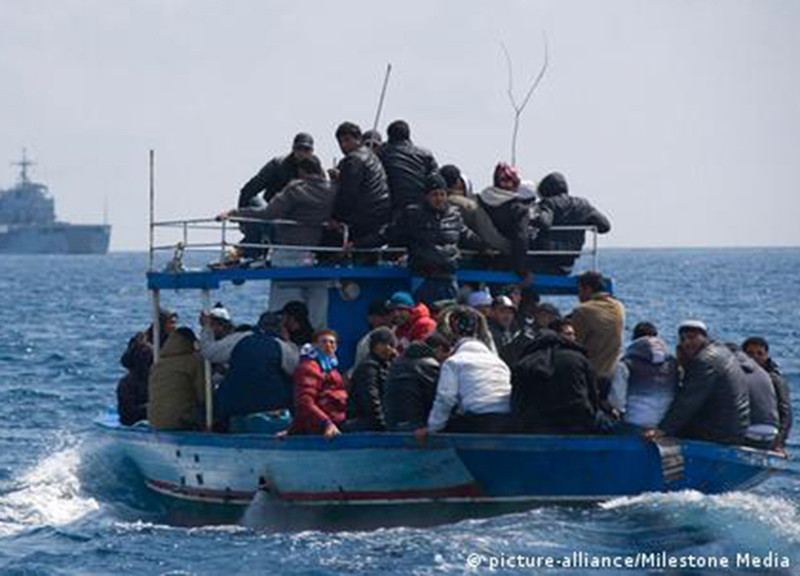
Their repressive rule is forcing thousands to make the treacherous journey across the Mediterranean
KIM GHATTAS - Financial Times
Europe is helping to entrench Arab autocrats by asking them to stem the flow of refugees across the Mediterranean, with no regard for their governance or human rights record. They, in turn, are only too happy to pose as partners, claiming they alone can protect Europe’s southern border from illegal migrants, in exchange for more cash.
Perversely, it is often the rule of those repressive leaders that is driving thousands of people from across the Middle East and North Africa to leave their homes and make the treacherous trip in the first place.
In its yearly threat assessment released in February, the US intelligence community singled out Tunisia as a particular problem in the region: “President Kais Saied’s ongoing consolidation of governing authority increases the risk for a serious breakdown in stability.”
Since then, Saied has in effect dismantled democracy in Tunisia. He whipped up racist sentiment, unleashing violence against sub-Saharan migrants which sparked a further refugee crisis. Human rights groups have accused Tunisia of dumping migrants in the desert on its border with Libya, where some have died of thirst. Skilled Tunisians are also leaving in droves.
Yet last month the EU signed a strategic partnership deal with Tunisia that offers several hundred million euros worth of help for economic development, but is mostly focused on cracking down on illegal migration and curbing departures. Another €900mn is in the pipeline, if Saied agrees to reforms demanded by the IMF.
Communities that host refugees deserve international support and financial aid can help create economic opportunities to keep migrants at home. Having said little about his power grab, the EU approach now rewards Saied for being a cruel autocrat and an incompetent steward of his country’s economy.
Italy’s rightwing Prime Minister Giorgia Meloni has also led the way in courting the de facto ruler of eastern Libya, General Khalifa Haftar, seeking his help to prevent departures from his country. Haftar, a warlord, is reported to have links to the smugglers. Then there is Egypt’s Abdel Fattah al-Sisi, upon whom President Emmanuel Macron bestowed the Légion d’honneur, France’s highest decoration, in 2020.
Sisi has spent billions on vanity projects like a new capital city while the economy takes a nosedive. Inflation has reached an all-time high of 35.7 per cent, the national currency has plummeted and Egyptians are facing power cuts in the sweltering heat. In 2022, Egypt suddenly made it into the top five nationalities of illegal arrivals in Europe.
While Europe works to keep refugees and migrants out, it expects other countries, such as Lebanon, Jordan and Turkey to host millions of refugees forever. Refugees in Lebanon are estimated to represent 25 per cent of the country’s overall population — compared to just 1.5 per cent in Europe. Syria is not safe for voluntary returns and Lebanon was rightly chided by the European parliament for forcing some Syrians to go home, where many are then rounded up by the regime of Bashar al-Assad.
The impact of such large refugee populations on the stability and social fabric of small countries like Lebanon and Jordan cannot be ignored. But as long as Syrians are not heading in large numbers to Europe as they did in 2014, Europeans seem content to ignore the festering wound in Syria. Meloni, who has in the past praised Assad, may even think he can be an ally on the refugee issue.
The long-term interests of Europe and the west are best served by democracy and good governance in the global south. Of course, policymakers have to deal with the world as it is, and not with the leaders they wished they had. But coddling dictators only cements their rule, creating a vicious cycle.
No one has yet cracked the code of how to maintain short to medium term stability while helping to deliver democracy and good governance in the long term. It requires vision and sustained, smart policies about thorny issues at a time of short public attention spans, dictated by-election cycles increasingly driven by populism. Sadly, band-aid solutions are becoming the norm in an age of policy gridlock on various challenges, including climate change, the effects of which will also make the migration crisis worse.
In June, the EU said it will join efforts to assess the viability of blocking out the sun to mitigate global warming — instead of focusing on curbing emissions. “Solar radiation modification” carries its own risks and is described by some experts as science fiction. So is the illusory stability promised by dictators.














